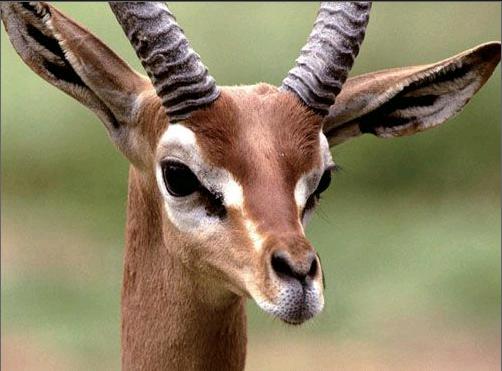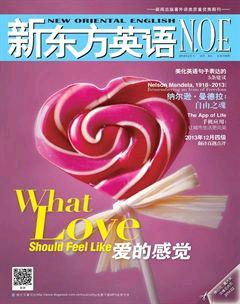Languages of Love: 10 Unusual Terms of Endearment 蜜語(yǔ)甜言:異乎尋常的10種愛(ài)稱(chēng)


Some terms of endearment can be used in many languages—“baby,” “angel” and “sweetheart” for example. But some dont travel as well as you might think. If you call a French person “honey” (miel) he or she may take it as an unflattering comparison with a sticky mess.
And how would you react if someone called you a cauliflower1), a flea or a baby elephant? Here is a quick guide to the language of love around the world—dominated by metaphors from cookery and the animal kingdom—with contributions by language coach Paul Noble.
Little Cabbage (French)
Petit chou
“Chou” (cabbage) is the French equivalent of “sweetheart.” “Chou” conveys the idea of being small and round and is used to describe French puff pastry2), often enjoyed as “chou à la crème.” “Chou” is said to resemble a babys or childs head too. Over the years, many French children have been told that boys were born in cabbages and girls in roses. You can double it too—“chouchou” is a standard translation for “darling.”
Pumpkin (Brazil/Portuguese)
Chuchuzinho
“Chuchu” is the word for “squash3)”—but strangely similar to the French “chouchou.” Could a French word have sneaked into Portuguese as a fancy way to refer to a loved one (even though it refers to a different vegetable)? The ending “zinho,” meaning “l(fā)ittle,” emphasises fondness.
An Egg-shaped Face (Japanese)
Tamago gata no kao
In Japan, women are frequently called “an egg-shaped face” by those who love them. This is a great compliment, as having an oval, egg-shaped face is considered very attractive in Japanese culture—you can see this in Japanese paintings through the ages.
Lump of Sugar (Spanish)
Terrón de azúcar
Like “honey” in English, sweet foodstuffs of one kind or another make popular terms of endearment in numerous languages. This popular one in Spanish, “terrón de azúcar” also means “sugar cube.” Apparently, it rates highly on the “sweetness” scale, so use sparingly.
Fruit of My Heart (Indonesian)
Buah hatiku
Although the term can be used romantically, featuring in love songs and poems, today it is most often used to express affection for children. Advertisers use the term to appeal to family-oriented customers, especially young middle-class couples: “The best gift/food/product for ‘the fruit of your heart.” You will also find the term in almost all books and articles on parenting, and it frequently appears as the name of organisations focusing on children, including a hospital near Jakarta.
My Flea (French)
Ma puce
“Ma puce” is roughly equivalent to “sweetie” in English. One theory suggests that it could be linked to the historic relationship shared by humans and fleas—in times past, removing fleas from one another became a one-to-one grooming4) activity, and is alleged to have been a pleasant and sometimes intimate process.
Gazelle5) (Arabic)
Ghazal
Classical Arabic poetry abounds with the imagery of beautiful gazelles (i.e. women, metaphorically speaking). There are numerous references to the “l(fā)ethal spears” of a beautiful womans gaze. If you believe the poets, hunters (i.e. men) can die of love-sickness after a single glance from a gazelle. Today too, a man may say to a woman, “You have the eyes of a gazelle.” (“Laki uyounul ghazal”) This may imply that he has fallen under her spell sooner than she has his.
Little Elephant (Thai)
Chang noi
Elephants are the dearest of animals to Thai people. They are supposed to bring good luck, white elephants especially. The elephant symbol might derive from the Hindu god Ganesh6), reflecting the great influence that Indian culture exerted across this region. Elephants so captured the nations heart that they once became an emblem7) on the countrys flag. “Little elephant” can be used affectionately by an adult to a child—used between adults it would have a different connotation.
Diving Fish, Swooping8) Geese (Chinese)
Chen yu luo yan
There is a story surrounding the greatest beauty in Chinese history, a woman named Xi Shi. Its said that she was so beautiful that when she looked at fish in a pond, the fish were so dazzled by her beauty that they forgot to swim and gradually dived to the bottom. Likewise, when geese flew over a woman called Wang Zhaojun, they were so struck by her beauty that they forgot to flap their wings and ended up swooping to the ground. Because of this, to this day, when a young Chinese man is in love with a Chinese woman, he may indicate that, to him, she is as beautiful as Xi Shi or Wang Zhaojun. To do this, he will say just four words: “Diving fish, swooping geese.”
Little Dove (Russian)
Golubchik (masc)/golubushka (fem)
Pushkin used the word “l(fā)ittle dove” to refer affectionately to his elderly nanny in the lines of one of his best-known poems, but she could equally have used it to refer to him when he was a child (and probably did). As a term of endearment it dates back at least to the Song of Songs in the Old Testament (“O my dove ... let me see thy countenance”), originally written in Hebrew. The Slavonic translation of the Bible had a profound influence on shaping the Russian language, so the Russian usage could have Biblical roots.
有些愛(ài)稱(chēng)在很多種語(yǔ)言中都能使用,例如“寶貝”“天使”和“甜心”,但有些并不像你想象的那樣通用。如果你稱(chēng)一個(gè)法國(guó)人為“蜂蜜”(miel),他或她也許會(huì)覺(jué)得這是拿一團(tuán)黏糊糊的東西打了一個(gè)不太恭敬的比方。
如果有人稱(chēng)呼你為“花椰菜”“跳蚤”或是“象寶寶”,你會(huì)做出怎樣的反應(yīng)?本文是世界各地的愛(ài)稱(chēng)——主要是來(lái)自烹飪領(lǐng)域和動(dòng)物世界的暗喻——的快速指南。語(yǔ)言教師保羅·諾布爾參與了本文的撰寫(xiě)。
小甘藍(lán)(法語(yǔ))
法語(yǔ)中的“chou”(甘藍(lán))相當(dāng)于“甜心”。“Chou”讓人聯(lián)想到小巧、圓鼓鼓的樣子,被用來(lái)描述法國(guó)酥餅。法國(guó)酥餅通常被做成“chou à la crème”(泡芙)享用。據(jù)說(shuō)“chou”還很像嬰兒或兒童的頭。多年來(lái),很多法國(guó)孩子都聽(tīng)過(guò)這樣的說(shuō)法:男孩是從甘藍(lán)中出生的,女孩是從玫瑰中出生的。你還可以將其用作疊詞——“chouchou”是“親愛(ài)的”這個(gè)詞的標(biāo)準(zhǔn)法語(yǔ)譯法。
南瓜(巴西/葡萄牙語(yǔ))
“Chuchu”是與“南瓜屬植物”相對(duì)應(yīng)的一個(gè)詞,但奇怪的是它與法語(yǔ)單詞“chouchou”很相似。難道一個(gè)法語(yǔ)單詞溜進(jìn)了葡萄牙語(yǔ),成為用來(lái)稱(chēng)呼愛(ài)人的一種奇特方式(盡管它指的是另一種蔬菜)?詞尾的“zinho”意為“小的”,強(qiáng)調(diào)了寵愛(ài)之意。
雞蛋形的臉(日語(yǔ))
在日本,女性常常被愛(ài)她們的人稱(chēng)為“雞蛋形的臉”。這是一種評(píng)價(jià)很高的贊美,因?yàn)樵谌毡疚幕校瑩碛须u蛋般的橢圓臉型被認(rèn)為是非常迷人的。你可以從歷代的日本繪畫(huà)中發(fā)現(xiàn)這一點(diǎn)。
方糖(西班牙語(yǔ))
就像英語(yǔ)中的“蜂蜜”一樣,在很多語(yǔ)言中,這樣或那樣的甜食會(huì)成為常用的愛(ài)稱(chēng)。西班牙語(yǔ)中這個(gè)常用的愛(ài)稱(chēng)“terrón de azúcar”就是“方糖”的意思。顯然,這個(gè)詞在“甜蜜”等級(jí)上排名很高,所以要省著點(diǎn)用。
我心中之果(印度尼西亞語(yǔ))
盡管這個(gè)詞可以用來(lái)表達(dá)浪漫之意,出現(xiàn)在愛(ài)情歌曲和詩(shī)歌中,但如今這個(gè)詞最常用來(lái)表達(dá)對(duì)兒童的愛(ài)。廣告商用這個(gè)詞來(lái)吸引重視家庭的顧客,特別是年輕的中產(chǎn)階級(jí)夫婦:“給‘你心中之果的最佳禮物/食品/產(chǎn)品。”你還可以在幾乎所有關(guān)于育兒的圖書(shū)和文章中發(fā)現(xiàn)這個(gè)詞。某些關(guān)于兒童的組織也經(jīng)常以這個(gè)詞來(lái)命名,包括雅加達(dá)附近的一家醫(yī)院。
我的跳蚤(法語(yǔ))
“Ma puce”大致相當(dāng)于英語(yǔ)中的“親愛(ài)的”。一種分析認(rèn)為,這可能與人類(lèi)和跳蚤的歷史關(guān)系有關(guān)——很久以前,相互捉跳蚤的行為成為一種一對(duì)一的梳理活動(dòng),并且據(jù)說(shuō)已經(jīng)成為一種愉快且有時(shí)很親昵的過(guò)程。
瞪羚(阿拉伯語(yǔ))
經(jīng)典阿拉伯詩(shī)歌中有大量美麗的瞪羚的形象(即女性的隱喻)。很多詩(shī)歌將美女的注視稱(chēng)為“致命的矛”。如果你相信詩(shī)人的詩(shī)句,那么獵人(即男性)在被一只瞪羚瞥一眼之后可能就會(huì)因相思而死去。如今,一位男士也會(huì)對(duì)一位女士說(shuō):“你長(zhǎng)著一雙瞪羚的眼睛。”這可能暗示這位男士已經(jīng)在這位女士被他迷倒之前而被她迷倒了。
象寶寶(泰語(yǔ))
象是泰國(guó)人最喜愛(ài)的動(dòng)物。人們認(rèn)為象可以帶來(lái)好運(yùn),特別是白象。象的象征意義可能源自印度神靈加內(nèi)什,這反映了印度文化對(duì)這個(gè)地區(qū)的重要影響。象令這個(gè)國(guó)家如此傾心,一度成為泰國(guó)國(guó)旗上的一個(gè)符號(hào)。成年人可以把“象寶寶”作為對(duì)兒童的愛(ài)稱(chēng);用于成人之間時(shí),這個(gè)詞就有了不同的含義。
沉魚(yú)落雁(漢語(yǔ))
關(guān)于中國(guó)歷史上最美麗的女子——西施,有這樣一個(gè)故事。據(jù)說(shuō)她是如此美麗,當(dāng)她注視池塘中的魚(yú)兒時(shí),魚(yú)兒為她的美麗而傾倒,以至于忘記游動(dòng),逐漸沉入了水底。類(lèi)似地,當(dāng)大雁從一個(gè)名為王昭君的女子頭頂飛過(guò)時(shí),它們?yōu)槠涿榔G而震驚,竟然忘記振翅飛翔,最后墜落到地上。正因?yàn)槿绱耍瑫r(shí)至今日,當(dāng)一位中國(guó)小伙愛(ài)上一位中國(guó)姑娘時(shí),他可能會(huì)暗示:對(duì)于他而言,她就像西施或王昭君一樣美麗。為了表達(dá)此意,他只說(shuō)四個(gè)字就行了:“沉魚(yú)落雁。”
小鴿子(俄語(yǔ))
在普希金非常著名的一首詩(shī)歌中,他把“小鴿子”這個(gè)詞作為對(duì)其老保姆的愛(ài)稱(chēng),但她同樣也可以在普希金還是個(gè)孩子的時(shí)候用這個(gè)詞來(lái)稱(chēng)呼他(可能就是這么稱(chēng)呼的)。這個(gè)詞作為愛(ài)稱(chēng)的用法至少可以追溯到《舊約圣經(jīng)》中的《雅歌》(“我的鴿子啊……求你容我得見(jiàn)你的面貌”)。《舊約圣經(jīng)》最早是用希伯來(lái)語(yǔ)寫(xiě)成的。《圣經(jīng)》的斯拉夫語(yǔ)譯本對(duì)俄語(yǔ)的形成產(chǎn)生了深遠(yuǎn)的影響,因此俄語(yǔ)中的這個(gè)用法可能源自《圣經(jīng)》。
1. cauliflower [?k?li?fla??(r)] n. [植]花椰菜
2. puff pastry:千層餅,酥餅
3. squash [skw??] n. 南瓜屬植物
4. groom [ɡru?m] vt. 梳毛;使整潔
5. gazelle [ɡ??zel] n. [動(dòng)]瞪羚(產(chǎn)于非洲和亞洲的一種小羚羊)
6. Ganesh:加內(nèi)什,長(zhǎng)有象首的印度預(yù)言神
7. emblem [?embl?m] n. 符號(hào);紋章(圖案)
8. swoop [swu?p] vi. (突然)下落,下降

